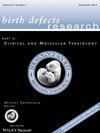Mechanism of pancreatic and liver malformations in human fetuses with short-rib polydactyly syndrome.
Q Medicine
Birth defects research. Part A, Clinical and molecular teratology
Pub Date : 2016-07-01
DOI:10.1002/bdra.23495
引用次数: 1
Abstract
BACKGROUND The short-rib polydactyly (SRP) syndromes are rare skeletal dysplasias caused by abnormalities in primary cilia, sometimes associated with visceral malformations. METHODS The pathogenesis of ductal plate malformation (DPM) varies in different syndromes and has not been investigated in SRP. We have studied liver development in five SRP fetuses and pancreatic development in one SRP fetus, with genetically confirmed mutations in cilia related genes, with and without DPMs, using the immunoperoxidase technique, and compared these to other syndromes with DPM. RESULTS Acetylated tubulin expression was abnormal in DPM in SRP, Meckel syndrome, and autosomal recessive polycystic kidney disease (ARPKD), confirming ciliary anomalies. SDF-1 was abnormally expressed in SRP and two of three cases of autosomal dominant polycystic kidney disease (ADPKD) but not ARPKD or Meckel. Increased density of quiescent hepatic stellate cells was seen in SRP, Meckel, one of three cases of ARPKD, and two of three cases of ADPKD with aberrant hepatocyte expression of keratin 19 in SRP and ADPKD. Immunophenotypic abnormalities were present even in fetal liver without fully developed DPMs. The SRP case with DPM and pancreatic malformations showed abnormalities in the pancreatic head (influenced by mesenchyme from the septum transversum, similar to liver) but not pancreatic body (influenced by mesenchyme adjacent to the notochord). CONCLUSION In SRP, there are differentiation defects of hepatocytes, cholangiocytes, and liver mesenchyme and, in rare cases, pancreatic mesenchymal anomalies. The morphological changes were subtle in early gestation but immunophenotypic abnormalities were present. Mesenchymal-epithelial interactions may contribute to the malformations. Birth Defects Research (Part A) 106:549-562, 2016. © 2016 Wiley Periodicals, Inc.短肋多指畸形胎儿胰、肝畸形的发生机制。
背景:短肋多指综合征是由初级纤毛异常引起的罕见的骨骼发育不良,有时与内脏畸形有关。方法导管板畸形(DPM)的发病机制在不同的证候中存在差异,尚未在SRP中进行研究。我们使用免疫过氧化物酶技术研究了5例SRP胎儿的肝脏发育和1例SRP胎儿的胰腺发育,这些胎儿有纤毛相关基因突变,有或没有DPM,并将这些与其他DPM综合征进行了比较。结果SRP、Meckel综合征和常染色体隐性多囊肾病(ARPKD)患者DPM中sacetylated微管蛋白表达异常,证实纤毛异常。SDF-1在SRP和三分之二的常染色体显性多囊肾病(ADPKD)中异常表达,但在ARPKD或Meckel中不表达。在SRP、Meckel (ARPKD三例中的一例)和ADPKD三例中的两例中可见静止的肝星状细胞密度增加,SRP和ADPKD中角蛋白19的肝细胞表达异常。即使在没有完全发育的dpm的胎儿肝脏中也存在免疫表型异常。伴有DPM和胰腺畸形的SRP病例显示胰腺头部(受横隔间质影响,类似于肝脏)异常,但胰腺体(受脊索附近间质影响)未见异常。结论SRP存在肝细胞、胆管细胞和肝间质分化缺陷,少见胰腺间质异常。妊娠早期形态变化轻微,但存在免疫表型异常。间充质-上皮相互作用可能导致畸形。出生缺陷研究(A辑)(06):549-562,2016。©2016 Wiley期刊公司
本文章由计算机程序翻译,如有差异,请以英文原文为准。
求助全文
约1分钟内获得全文
求助全文
来源期刊

Birth defects research. Part A, Clinical and molecular teratology
医药科学, 胎儿发育与产前诊断, 生殖系统/围生医学/新生儿
CiteScore
1.86
自引率
0.00%
发文量
0
审稿时长
3 months
 求助内容:
求助内容: 应助结果提醒方式:
应助结果提醒方式:


